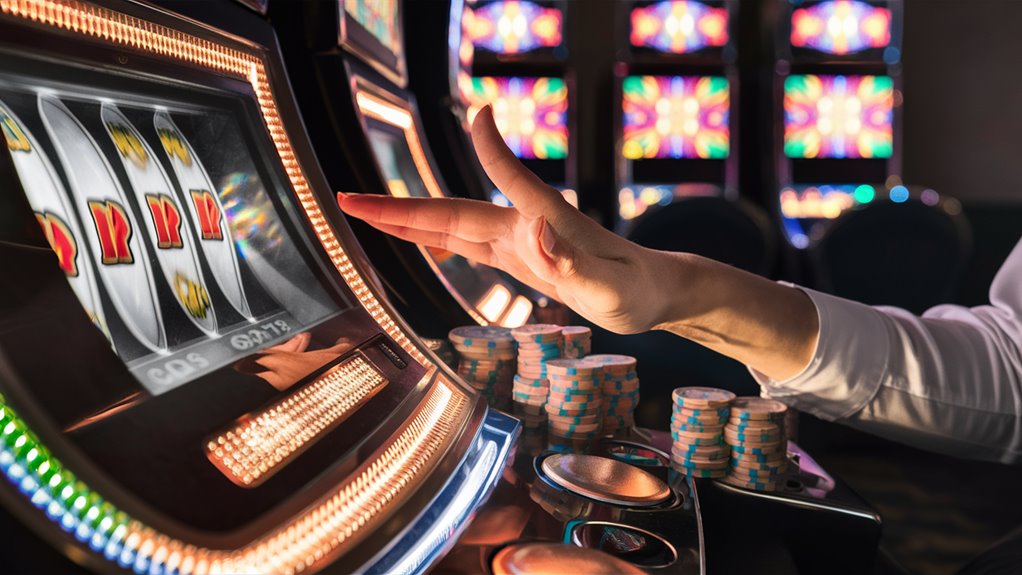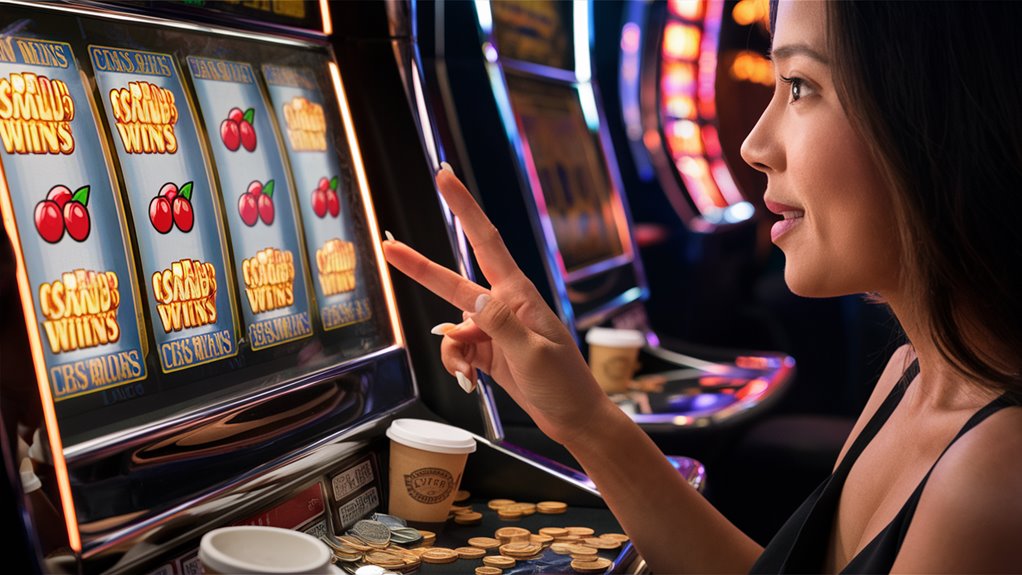
Why Slot Machines Keep You Hooked

Slot machines are the top cause of gambling addiction, made to mess with your brain’s reward zone. They use changing reward plans to make wins feel random, which puts out more happy brain chemicals than normal winning ways.
Messing with Your Mind by Design
The careful mix of sounds and lights in today’s slots makes a rich sense-feeling that tricks your brain into seeing close losses as wins. These games use just-right sound and bright lights to make your brain feel like you win, even when you lose. https://maxpixels.net/
Setting and Tech Drive Addiction
The private playing spots of slots add to their draw. Fast plays, with more than 1,000 spins an hour, keep you hooked in a non-stop loop. The way these games work can make you feel like you’re in a trance with endless sights and sounds.
Losses Feel Like Wins
New slot machines trick you by showing losses as wins with fun noise and pictures. This sly feedback loop hides how often you lose, which keeps up your drive to play while hiding how much you spend.
The craft in these machines is a lesson in mind tricks, making an experience that sticks you to the game and ramps up addiction risk through well-known brain hooks.
The Tricks Behind Random Wins
The Lure of Random Rewards
Random reward ways, a key discovery by B.F. Skinner, show the deep mind games behind addictive acts.
Research shows that random prizes drive harder-to-break habits much more than steady prizes. This effect, named the changing reward plan, is a big deal in today’s design.
How Uncertainty Hooks You
Brain studies find that when the win isn’t sure, the brain makes more feel-good chemicals than with sure things.
Waiting for a win is rewarding itself, keeping you in the game even when you mostly lose.
Almost-wins fire up brain zones just like real wins, as seen in brain scans of gamblers.
Making Rewards Work Better
Today’s designers use exact reward tuning to keep you playing.
The best setups often use a 45% win chance, balancing hope and want well.
This uses the prize guess mistake idea, where unexpected good things make the brain’s response stronger, boosting the effect of random rewards.
Key Mind Hooks:
- Changing reward plans
- Dopamine levels
- Almost-win effects
- Prize guess mistakes
- Keeping you hooked
Almost Wins Make You Play More
The Mind Game of Close Losses
The Power of Near Wins
Just-missed wins in slots hit your brain hard when icons just miss lining up right.
Studies find these close calls start almost the same dopamine flows as real wins, making a strong habit hook. Your brain sees these near wins not as fails but as hints you’re about to win big.
Your Brain on Near Wins
The brain act on near wins looks a lot like it does on true addictions.
Scans show close losses fire up the brain’s reward spots, making chemical rushes like what drugs make. Each game feels like a fresh chance to win, even though, really, each spin is by itself.
Making Games with All-Around Hooks
Slot designers smartly add more near wins than by chance alone.
This smart hook now makes some places limit how games are set. Research says people who see near wins often stick to games longer and bet more than those who don’t.
Too Much for Your Senses Drives Play
All Your Senses in Overdrive: How It Keeps You Playing
The Science of Sensing More in Games
Today’s slots tap into full-on sense play with smart use of lights, sounds, and pictures.
Game makers plan these wrap-up lands to keep you in the game by tapping into all how your mind works at once.
How Sensing a Lot Changes You
The rich sight-sound mix makes each win feel big, hiding how small some prizes are.
This smart mix pulls you into a ‘flow,’ where you forget time and just keep playing.
Hooking You in Through Your Senses
The smart play of sights and sounds builds strong habit paths.
Old win sounds like coins falling still hit the brain’s reward zone today, even though the games are now digital and use no real coins.
How Tech Boosts Addictive Parts
Tech Upgrades Make Slots Harder to Quit

New Tech Changes Old Games
Today’s digital slot tech turns old-time slot games into high-hook platforms.
Makers use hard math plans for near wins and timed prizes, keeping you in the game with how smart computers are now.
Adding New Game Plays and Tracking You
Digital slots now have unheard-of bits like:
- More ways to win at once
- Your own game rounds
- Prizes that build up
- Watching what you do right then
Tech Makes Losses Riskier
Smart Game Plans
Today’s tech lets games do things like:
- Show losses as wins with fun sounds and lights
- Let you bet fast on lots of chances
- Change wins based on how you play
The Pull of Small Wins
The Mind Hook of Little Wins: Knowing the Reward Plans
The Think of Changing Win Plans
Changing win plans are big in mind study, shown much in slots.
These games make sure to give you small wins often, which start deep brain paths.
How Today’s Tech Matches Win Plans
Smart slots use hard math reward plans built to tap deep into your mind.
These plans work by making even small prizes seem big with a lot of fun feedback.
Hooking Loop Plan
Mixing tiny wins and near wins forms a strong feedback loop.
This set plan keeps players stuck between hope and seeing some success.
When You Play Alone
The Draw of Playing Slots Alone
The Lone Way of Slot Gaming
Being alone weighs a lot in why slots are hard to stop. These games make you feel alone with the machine, away from what’s around you.
While other casino games get folks to talk, slots tie you down in a one-way chat with the game.
How Being Alone Affects You
Looking at problem play shows how being alone helps add to the game’s pull. Being by yourself drops blocks that might stop your game, keeps away others’ thoughts, and gives you a space to hide from bad moves and habits.
How the Game Is Built to Keep You Alone
Modern slot design really pushes staying alone with smart space-making. Tall chairs, how machines stand, and even the air sounds carve out personal spots that keep others away.
The fast play and rich game world stop chats with others, as you lose track of time, money, and friends.
Losses Seem Like Wins
The Twist of Seeing Losses as Wins Cindersong Poker: Resonating Smoky Freedoms Into Pot-Tuning Crescendos
How Losses Seem Like Wins
Slots use mind tricks called “losses as wins” (LDWs) that make losses feel like wins.
When players bet on many chances, the games cheer even during real loss. For example, if you bet $1 and get back 25 cents, the game still lights up and sounds like you won, when really you lost 75 cents.
Your Brain on These Tricks
Looking into it shows that LDWs fire up your body just like true wins do. Your heart beats faster, you sweat more, and your brain makes lots of happy chemicals – all the things that happen with real rewards.
How New Slots Max LDW Use
New multi-line slots are built to up the LDW count, with some machines giving this fake cheer on up to 30% of spins.

